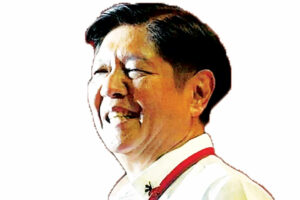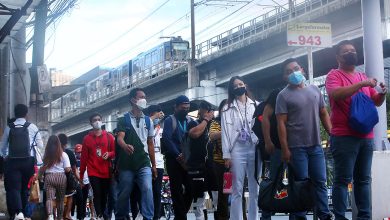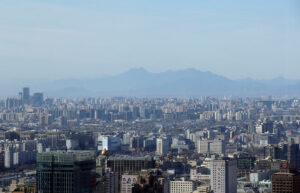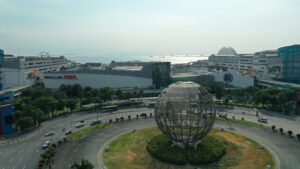Rule-of-law, credible commitment, and investment under President Marcos Jr.

There is a wise game theory principle called “backward induction rationality” which states that no matter what came before, your next and subsequent moves should be dictated by the best outcome you can attain at the conclusion of the process. Ferdinand Marcos, Jr. is president of the Philippines for the next six years. Our best course of action should now be anchored on the best possible outcome for the nation given these new political and economic realities.
One salient economic reality is the draconian P13-trillion public debt and 8% fiscal deficit — worrying because these were fellow travelers when the Philippine economy was hurtling to the bottom of the East Asian barrel. A debt crisis? Not if the economy grows rapidly and sustainably faster than the debt. But since sustained economic growth flows from sustained high investment, the question is: How will investment behave moving forward?
The healthy Q1 2022 growth was widely hailed as a portent for that future. But is not the Q1 growth largely a low base effect and vengeance spending story? The massive 20% growth in investment baked in a catapult sling of -14% growth in Q1 2021. The 8.3% Q1 2022 GDP growth got an adrenalin boost from a -3.8% GDP growth in Q1 2021. For all the hullaballoo, the investment rate (Gross fixed capital formation or GFCF share in GDP) in Q1 2022 stayed at a low of 21.5%. That portends anemic, not stellar growth. Our investment rate has always miserably lagged behind our rivals. An average investment rate in the 25%-40% range sustained for two or more decades was the propellant for the East Asian miracle economies.
On the heels of Q1 growth came the boast of the National Economic and Development Authority (NEDA) that the high middle-income status is doable for the Philippines by 2023! Truly, we live on hope!
A high middle-income status means, by World Bank standards, a per capita income of between $4.09 thousand and $12.6 thousand. In 2021, our per capita income was either $3.16 thousand by World Bank et al. or $3.5 thousand by the Philippine Statistics Authority (PSA) reckoning. If we go by the PSA’s reckoning and if GDP grows by the NEDA’s target (7% in 2022 and 2023), we will still be at $4,000/capita in 2023 or lower ($3.93 thousand/capita) if we factor in population growth of 1%. If by the $3.2 thousand estimate, we would just be at $3.66 thousand in 2023 ($3.59/capita with population growth). Starting with $3.2 thousand and factoring in population growth, we shall barely make the high middle-income country status by 2026. And we could still miss the doubtful honorific — with global inflation hitting new peaks, the target will likely be $4.2 thousand by 2023. Meanwhile, the NEDA target of 7% growth is itself aspirational; the continuing oil and food price spikes coming on the heels of the lingering COVID-19 crisis see to that. President Rodrigo Duterte’s watch in more growth conducive times (excluding the pandemic years of 2020 and 2022) could only manage a real GDP rate of growth average of 5%, less than the 6.2% under President Benigno Aquino. Since it is investments that will make or break us, how will investments fare?
Investment comes both from the government and the private sector. When Duterte came to power in 2016, the government had money flowing out of its ears, thanks partly to what a current (and past) fiscal appointee once called the “crime of underspending” under President Aquino. When Marcos pere seized power in the 1970s, recycled petrodollars were begging to be borrowed at giveaway real interest rate. Marcos pere’s martial law watch (1972-85) attained no more than 3.2% GDP growth. By contrast, Marcos Jr. comes to power when the fiscal till is empty and facing greater demand for safety net resources. Granting the Philippine economy more open under President Marcos Jr., will private investment cover the comedown in government investment? Unlikely. Curses are likelier for the sitting president when the new taxes and spending reduction hit the road. Leni Robredo, more valuable to the nation now as a symbol than as a commander-in-chief going to war without bullets, will be spared those curses. Duterte sure paved the way for BBM to become PBBM, but it could also be fiscally booby-trapped to pave a detour to Vice-President Sara Duterte. One consolation for those fearful of Marcosian excesses: penury is a poor hunting ground for profligacy!
With an elevated fiscal deficit (the programmed deficit is 8.2% of GDP for 2023) and a faltering credit rating, further foreign borrowing will be limited. We will compete with more politically popular Ukraine- and hunger-related sovereign and multilateral loans. The sale of government assets has bailed out past tottering fiscal positions but the most valuable state assets have already been alienated. IMF-type conditionalities — new and/or higher taxes and reduced spending — beckon. So, it is really higher taxes or bust for the Department of Finance (DoF)!
And there’s the rub — with Filipinos still aching from a serious income spill, will not higher taxes be greeted with great resentment? Complicating the DoF’s problem: the final arbiter on spending has a tax evasion conviction on his head and has an unsettled estate tax liability. With likely higher taxes, a foreign investor will think twice about locating in the Philippines whose corporate income tax is 25% versus Vietnam’s 17%. Philippine Economic Zone Authority investment pledges continue to retreat, agnostic it seems to recent reforms. Foreign investment is extremely sensitive to the rule of law which dwells as much on how the rules are enforced as on how the rules are written.
One route to more private investment for a fiscally strapped economy is Public Private Partnership (PPP). PPP’s harvest has so far impressed. But here, Duterte’s legacy weighs heavily. Big business began to sour to PPP since Duterte refused to abide by the Singapore arbitral ruling and threatened unilateral expropriation. Rule-of-law? What rule-of-law? Additionally, the proposed Implementing Rules and Regulations of the Amended Build-Operate-Transfer Law will exempt the government from legal liability for adverse government actions. Bad for PPP.
With such negative baggage, the best recourse for President Marcos Jr., from a game theory perspective, is to offer credible commitment(s) that he will be a zealot for the rule of law. The operational word is “credible,” meaning, hindi lang laway kasi makirot pag-ibinali-laway (not just spit because it hurts to eat your words).
Some possible credible commitment devices are:
1.) Appoint to positions of power people who have built reputations for uprightness and competence and are unafraid of being fired for telling the boss the truth. Marcos Jr. has done this rather well by his announced economic team appointments. Reason for optimism sure but also caution! Then-President Joseph “Erap” Estrada accomplished as many plaudits with his appointments (some of the faces are the same) but he proceeded to blindside them in favor of his midnight cabinet and the Erap promise went pfft. Ferdinand Marcos’ cabinet was unparalleled in individual stature and graduate school credentials, but they functioned mainly to borrow recycled petro-dollars which bankrolled behest loans to cronies and mindless shopping sprees. That President Marcos Jr. will privilege his appointees’ judgment over his family and political interests resides in the realm of prayer.
2.) Should Duterte defer to the president-elect, Marcos Jr. should introduce a strong Material Adverse Government Action (MAGA) provision (government can be made to account by the law courts for adverse actions) in the IRR for the Amended BOT law before signing.
3.) President Marcos Jr. should signal his intention to enforce the decision of the Singapore arbitral court if on a much-staggered basis.
Finally, 4.) Marcos Jr. should start the process of settling the estate tax liabilities imposed by the Supreme Court in 1997 if on a gentle glide path as a public commitment to the rule of law.
As studies confirm repeatedly (see e.g., Daway-Ducanes and Fabella, 2022), few factors matter more for the investment rate than the rule-of-law!
Raul V. Fabella is a retired professor of the UP School of Economics, a member of the National Academy of Science and Technology and an honorary professor of the Asian Institute of Management. He gets his dopamine fix from bicycling and tending flowers with wife Teena.




